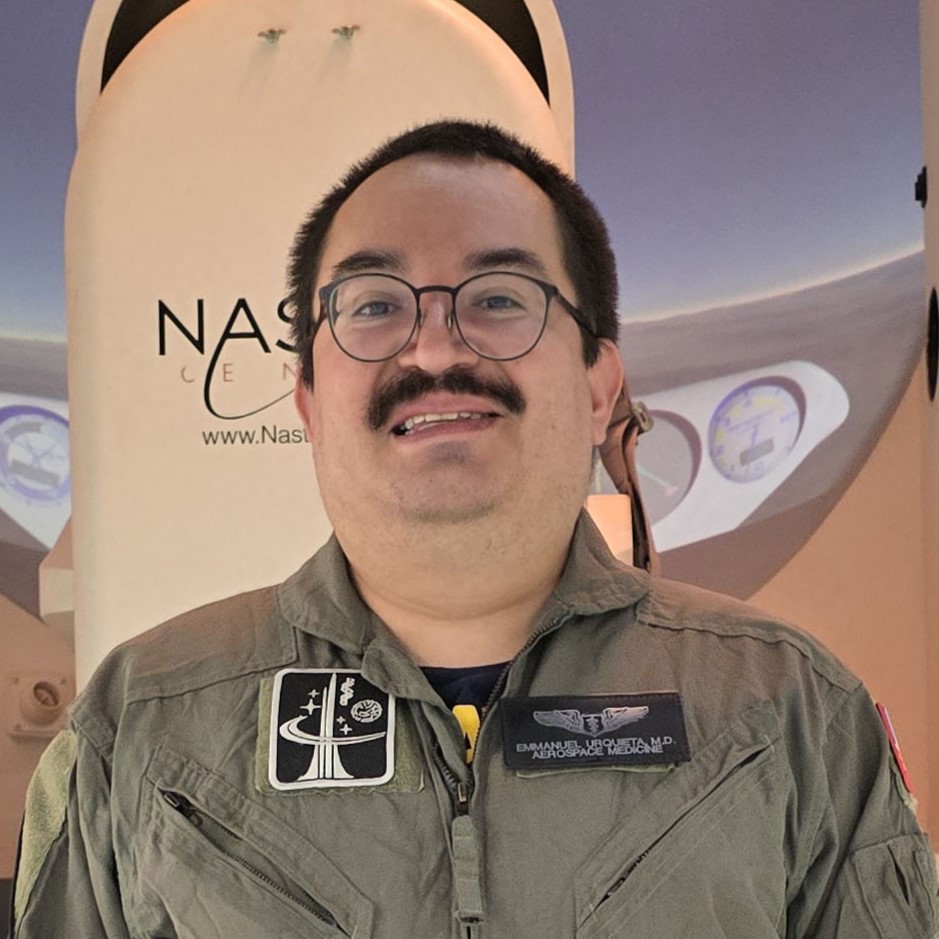UCF’s College of Medicine has hired an internationally recognized space medicine expert to expand research into how spaceflight affects humans and create a space medicine curriculum for students across the university.

Dr. Emmanuel Urquieta comes to UCF after serving as chief medical officer of the NASA-funded Translational Research Institute for Space Health (TRISH) led by the Baylor College of Medicine. He will serve as vice chair for aerospace medicine in the college’s Department of Medicine and hold the academic rank of associate professor.
Learn more about the UCF College of Medicine Aerospace Medicine Program.
“Dr. Urquieta is a recognized leader in space medicine,” said Dr. Deborah German, vice president for health affairs and dean of the College of Medicine. “Through his leadership, UCF will become a model of interdisciplinary medical research that will improve the health of space travelers and those of us on Earth. UCF was born as a university to support the space program and the College of Medicine is continuing this mission.”
Dr. Urquieta said UCF’s location so near the Kennedy Space Center and the opportunity to collaborate in research and education across 13 colleges are major assets in making the university a recognized leader in space medicine.

“There couldn’t be a better location to study the health effects of human space flight,” he said.
The Impact of Space Medicine Research
The space industry recognizes the health impacts of space travel and has put an emphasis on addressing these issues as more people go into space. These medical priorities include:
- Radiation exposure
- Zero gravity’s impact on the muscles and skeleton, including bone loss
- Eye health
- Space motion sickness
Research into these conditions also can help patients on Earth. For example, Dr. Urquieta said multiple studies have shown that space travel increases stress and oxidation in the body. Because stress and oxidation contribute to inflammation which is a major contributor to multiple diseases, studies on ways to prevent inflammation in space may lead to anti-aging treatments on Earth, he said. Research on radiation exposure can impact cancer patients undergoing radiation therapy, and developing medical technologies for the extreme of space could improve medical care on Earth, especially in isolated and underserved areas.
He noted that telehealth was created by the space program to help astronauts who became ill in space and was later instrumental in caring for patients during the pandemic.
As NASA plans to send humans to Mars, medical care of space travelers will become even more critical as astronauts will be in space for 900 days. Because a spacecraft’s space is so limited, physicians and scientists must develop technologies to diagnose and treat conditions remotely with far fewer tools than they have on Earth, he said. Such research discoveries could improve care to members of the military and patients in rural and remote areas worldwide.
Creating a Space Medicine Curriculum
As an educator, Dr. Urquieta will develop a space medicine curriculum that will be relevant to students across UCF, including those in medicine, nursing, engineering, computer science, and optics and photonics. He hopes that such an interdisciplinary program will help create space medicine experts who can better communicate and collaborate in keeping space travelers healthy.
“This is a challenge currently,” he said. “We need to create learning programs where students learn to understand and speak each other’s technical languages. Engineers are focused on fixing the problem. We as doctors are focused on fixing the people.”
He wants to create a UCF master’s degree in space medicine. The only such program — at Wright State University where Urquieta trained — has closed. So UCF’s program would be the only one in the nation open to graduate students. Similarly, he hopes to create a fully accredited aerospace medicine residency program to add to the College of Medicine’s graduate medical education program, which is one of the fastest growing in Florida. This civilian residency program will be the second one in the nation.
“With these educational programs, we can train tomorrow’s space medicine leaders,” he said.
Dr. Urquieta received his M.D. and did his residency training in Emergency Medicine at Universidad Anahuac Mexico Norte in Mexico City. He says he became interested in space medicine because his father is an aerospace engineer and his grandfather is a pilot. Urquieta earned his professional pilot’s license during medical school. He has also experienced spaceflight training, having spent 30 days in a windowless spaceflight analog (NASA’s Human Exploration Research Analog) to understand the isolation astronauts experience.
Dr. Edward Ross is chair of the Department of Medicine and has spearheaded the growth of the space medicine program, including the recruitment of Dr. Urquieta. Dr. Ross said Dr. Urquieta’s hiring will magnify UCF’s role in space medicine.
“This takes us to the next level in aerospace medical research and education,” he said. “We can help make space travelers safer and bring those medical discoveries back to Earth.”